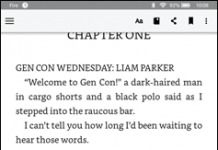 Mike Shatzkin’s latest blog entry has some interesting points to ponder. Mainly, he has his say about Carolyn Reidy’s much-remarked-upon remarks about backlist in her keynote at the Book Industry Study Group’s meeting. But he also has some things to say about e-books enabling extraterritorial sales.
Mike Shatzkin’s latest blog entry has some interesting points to ponder. Mainly, he has his say about Carolyn Reidy’s much-remarked-upon remarks about backlist in her keynote at the Book Industry Study Group’s meeting. But he also has some things to say about e-books enabling extraterritorial sales.
In regard to extraterritorial sales, Shatzkin links back to a previous blog post of his on the matter, and to an even earlier one suggesting Europe could be a good sales destination for English-language titles. Shatzkin feels e-books are perfect for selling internationally, though he doesn’t address the fact that many authors and agents still find it more lucrative to sell rights piecemeal. As long as that’s the case, it’s going to be harder to sell those e-books globally.
But then he takes this in an unexpected direction, tying it into Author Earnings’s report suggesting indie titles are stealing marketshare from the Big Five. Shatzkin thinks that indie titles’ numbers are being skewed by including sales from outside the USA, where they aren’t included in the sales figures for Big Five titles.
But the comparison can also be skewed. All Amazon sales from outside the US that are not made through a local Amazon store are credited to the US store. And when Amazon distributes indie ebooks, they always (or at least almost always) have global rights. So it could well be the case, and often is, that the publisher-ebooks that are being compared to the indie-ebooks are working on a smaller territorial base for sales. There is an apples-to-oranges problem that makes it difficult to compare Amazon sales of indie ebooks to those from publishers.
Shatzkin also points out, as Reidy does, that there are inherent marketing opportunities inherent in a publisher’s backlist that may not yet have been fully exploited. If publishers pay attention for instances of backlist titles getting mentioned in media or social media, they can take advantage of that opportunity and increase their sales.
It will soon be seen as necessary to employ technology to monitor the news and social graph and to “bounce” the results of each “daily opportunity” off the possiblities in the backlist. It will for quite a while longer still require humans to do some targeted research into what today’s relevant search terms are and to write the descriptive copy that will respond to them, but technological assistance will multiply the effectiveness of the human efforts.
Since e-books don’t have to be “reprinted,” the backlist titles have an effectively evergreen sales potential. This is old news to a lot of independent authors, but it seems that publishers have been slow to take notice. But given Reidy’s remarks, Shatzkin suggests that might be changing.
It’s an intriguing idea. The way things have been until now, publishers have focused the brunt of their marketing efforts on the frontlist, and let the backlist take care of itself. But there can be value in that “long tail,” if the publishers can just figure out how to find it.

































